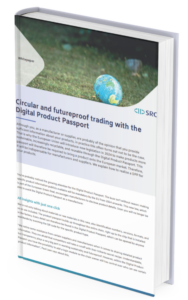The digital product passport (DPP)
The digital product passport makes important data regarding a product and the origin of this product transparent to everyone. Its introduction is an initiative of the European Commission and fits within the framework of sustainability.
Digital Product Passport: what is it?
Each product has its own sustainability characteristics. But not all of these characteristics are known or well understood. The digital product passport (or ‘digital product passport’ or simply DPP) offers consumers, companies and policymakers answers to questions such as: where the product comes from, how it is made, how it can be reused and which sustainability labels it has.
Products are given a unique identification code that can be scanned. In this way, consumers, chain partners, governments and other stakeholders gain access to product information. The purpose of the digital product passport is to promote the sustainability of products. Transparency is offered about the composition and supply chain of a product. This transparency facilitates the repair, reuse and recycling of products.

Why do we need the Digital Product Passport?
The digital product passport is required by the EU. The new law is part of the ‘European Green Deal’ and was created to achieve a circular economy. We live in a consumer society. As a result, we produce a lot of waste. Although reuse and recycling are important methods for reducing our waste mountain, the extent to which reuse and recycling are applied is still relatively low.
The amount of waste we produce depends, among other things, on the way in which products are produced. Product cycles of most products are still linear today. This means that raw materials for a product are collected and processed into a product. This product is then sold and also used. When the product is broken or no longer needed, it disappears on the waste mountain.
This process is not sustainable because it leads to the depletion of raw materials and therefore also to high waste production. A circular production process, on the other hand, keeps materials and products in use for as long as possible and minimizes waste by recycling and reusing.
The Digital Product Passport guarantees information and transparency
The precondition for circular processes is that the options for repair, recycling and reuse must be known. This is exactly where the DPP will play a major role.
The information needed to extend a product’s cycle is often still lacking. Sometimes the information is available, but not easy for the user to find. While it is precisely information that consumers need to use products better and for a longer period of time. The same applies to the waste processor or recycler. The DPP facilitates the provision of information mentioned above.

For which products does the digital product passport apply?
The digital product passport will be mandatory from 2025. Every producer or supplier who then wants to sell a product on the European market must meet the requirements of the digital passport. These requirements apply to both finished products and sub-products.
Implementation of the digital product passport starts with products that use the most resources and with products where the potential for circularity (repair, reuse and recycling) is the highest. These are the product groups: batteries and textiles. Building materials and electrical appliances will soon follow.
*The DPP obligation does not apply to food, nutrition and pharmaceutical products.
From product life to product lifecycle with the Digital Product Passport
What is the impact of the DPP on your organization, and how do we move from a linear economy to a circular economy. We discuss this in this blog.

What does the Digital Product Passport mean for manufacturers and suppliers?
The DPP becomes an obligation on the European market. And although its introduction seems simple at first glance, it requires the necessary effort from producers and suppliers. It is time for them to act and get the necessary things in order. The motivation for this is that the digital product passport is not only an obligation, but also offers the opportunity to improve the sustainability of products and processes.
What role do data standards play?
Standards play a major role in realizing the DPP. They ensure uniform information provision within Europe. This is not only useful for producers, but also for chain partners and consumers.
The standards make it possible to correctly identify products and locations and to store and share information automatically. Standards are necessary to link the DPP to the physical product and make it possible to remove barriers between producers and chain partners.
The advantages of the digital product passport
The DPP will be made mandatory in Europe from 2024. Its implementation is quite a bit of work, but it certainly offers advantages.
Sustainability benefits
The DPP was created to achieve a circular economy. It contributes to reducing the carbon footprint and stimulates sustainable production and consumption. This is important for conserving natural resources and protecting the environment. But the implementation of sustainable processes also promotes competitiveness and thus economic prosperity.
Consumer benefits
By scanning the DPP, the consumer gains insight into information regarding the composition and supply chain of the product. It also becomes clear how the product can be repaired, reused or recycled. Today’s consumer needs information and transparency. The DPP meets the needs of consumers in this area.
Benefits for producers and suppliers
The digital product passport gives companies the opportunity to collect and manage detailed product information and contributes to the sustainability of products and supply chains. The DPP also offers suppliers and manufacturers the opportunity to make better decisions in the field of sustainability, as well as to draw up stronger sustainability claims.
Trade circularly and future-proof with the Digital Product Passport
Although you, as a manufacturer or supplier, probably believe that you provide sufficient information about your products, in practice this often turns out not to always be the case. In this white paper we explain how you can prepare for the Digital Product Passport in time.

The advantages at a glance
The Digital Product Passport therefore offers several advantages. These can be summarized as follows:
- Regulations: the digital product passport helps manufacturers to comply with legal regulations. This prevents fines and legal problems.
- Sustainability: The DPP promotes the sustainability of products and promotes the repair, reuse and recycling of products. In this way it contributes to a circular economy.
- Consumer information and transparency: the passport provides consumers with better information about the origin, composition and use of a product. This offers transparency and the consumer receives what he needs: product information.
- Efficiency: The DPP provides a collection point for all product information and thus simplifies the management of this information. The DPP also contributes to the sustainability of products and supply chains and promotes competitiveness.
- Regulations: the digital product passport helps manufacturers to comply with legal regulations. This prevents fines and legal problems.
How can you get started with the Digital Product Passport?
The digital product passport has no chance of success if data is not correct. An error in data means a lot of time and effort to solve this again. This is valuable time that a producer or supplier does not have due to the European obligations that will come into effect soon. Investments in professional IT systems enable efficient realization of the DPP and are therefore justified.
The importance of PIM
To accurately collect and manage product data for the DPP, an information management system (PIM) is necessary. This system facilitates collecting the required data, linking the right data to the right product and managing this data simply and efficiently. Because the relevant product data is maintained at the back, the information is always up-to-date.
By linking the digital product passport (which includes recycling and repair modules, among other things) to a PIM, the product information always meets standard obligations.
The DPP can be hosted on a platform of your choice. By linking the platform to PIM, registered product data is communicated in real time with the DPP. This is one of the places where PIM places the information. This can be set up in the environment of SRC, but it can also be hosted via SRC at your own location so that you, as a product owner, retain full control over your data.
SRC’s DPP experts
At SRC we like to realize this for our customers. SRC has over 30 years of experience as a PIM supplier and we dare to call ourselves a credible and reliable implementation partner for the digital product passport.
Based on your wishes and needs, our DPP specialists set to work to set up the digital product passport so that you can comply with the legislation and your business needs.
Would you like to discuss the options for your product first? Even then we are happy to make time for you. Contact us at dpp@src.eu!
Curious about the possibilities?
Request a meeting with our experts and get to know our solutions.
